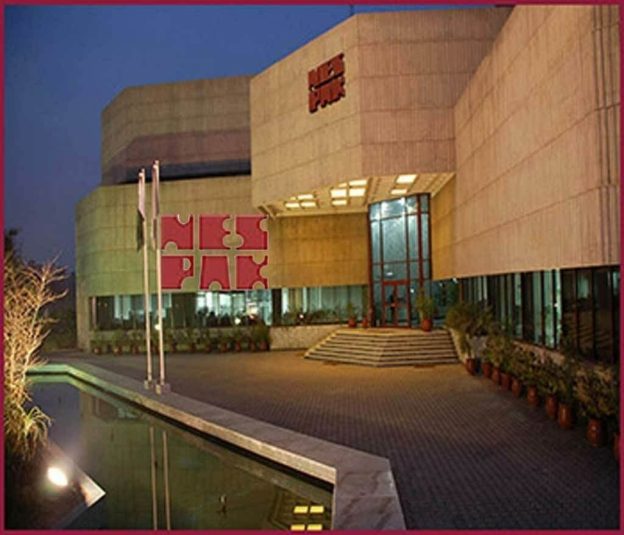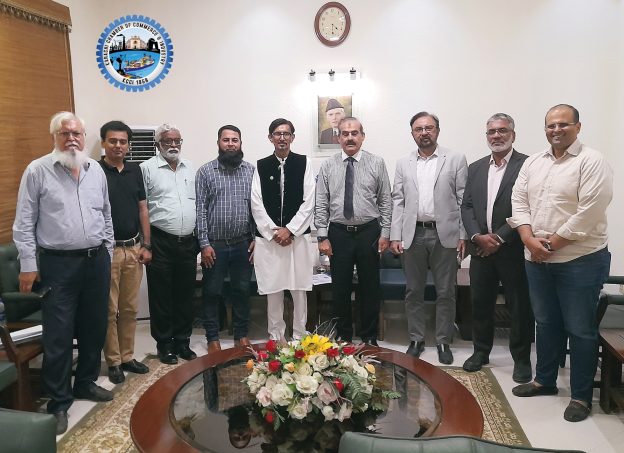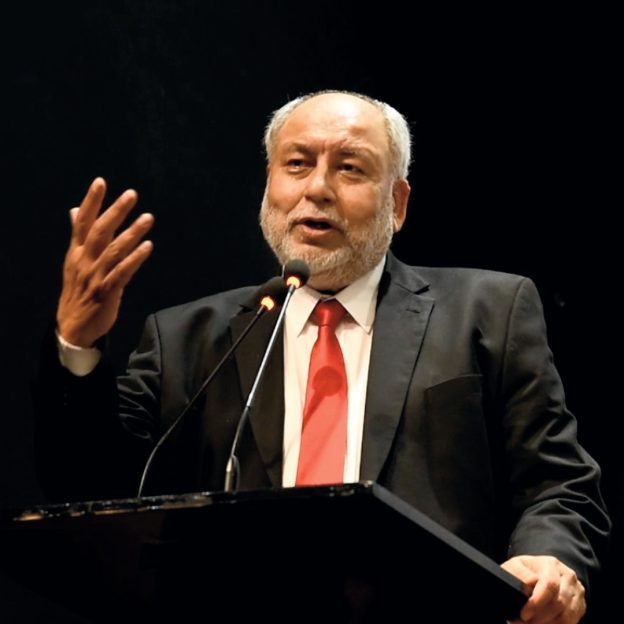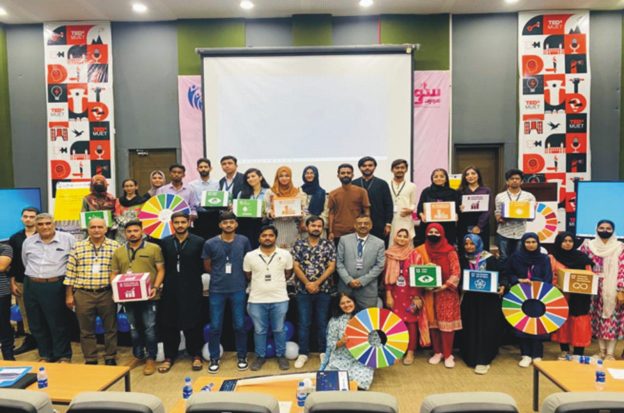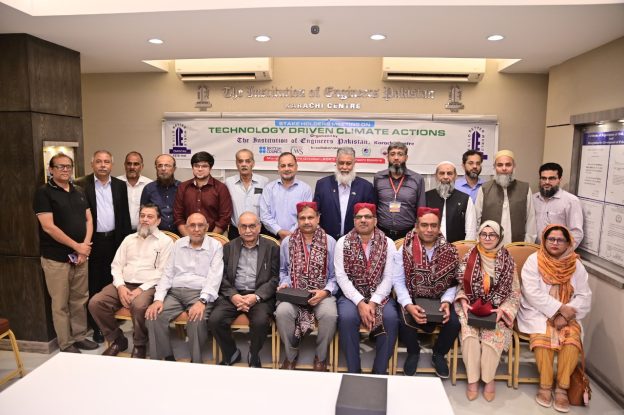Introduction: MUET, in conjunction with IEEE SIGHT (Special Interest Group on Humanitarian Technology) Karachi Section and with the backing of IEEE Asia Pacific Region 10, orchestrated an event titled “Building Sustainable Communities and Empowering Action against Climate Change.”
This collaborative initiative involved EU Erasmus Plus ACTIVE program, QSIMPACT Pakistan, and IEEE MUET Chapter, coinciding with the celebration of EU Erasmus Day.
The event featured distinguished guests, including Vice Chancellor Prof. Dr. Tauha Hussain Ali as the Chief Guest for the “Building Sustainable Communities and Empowering Action against Climate Change” segment and Prof. Dr. Muhammad Aslam Uqaili, former VC MUET, as the Chief Guest for the Erasmus Day celebration event.
The Vice Chancellor Professor DR. Tauha Hussain, applauded the collective efforts and honored the participants with tokens of appreciation. A panel of esteemed speakers addressed pertinent topics during the gathering. Prof. Prakash Lohana shed light on “Empowering Women for Sustainable Climate Resilience,” while Ms. Bathe Eden emphasized the role of QS ImpACT Pakistan in empowering youth to contribute positively to their communities, aligned with the United Nations 17 Sustainable Development Goals. Furthermore, Prof. Dr. Bhawani Shankar Chowdhry delved into the “ICT-Based Application for Sustainable Environmental Protection,” and Prof. Dr. Tanveer Hussain focused on “Climate Crises in Pakistan.” The discussions also encompassed Prof. Dr. Sheeraz Ahmed Memon’s insights on “AI and ICT Game Changers for Environmental Challenges,” Engr Zakir Sheikh and Ms. Aisha’s discourse on sustainable Development goals and Engr. Najeeb’s presentation on “Climate Change and Sustainable Processes for Carbon Reduction” from an Italian university perspective. The overarching objectives of the event were to foster a unified approach towards environmental consciousness and its intersection with community welfare, aiming to: Enhance awareness regarding the impact of climate change on both the environment and communities. Provide comprehensive educational and training opportunities for volunteers, enabling them to actively participate in sustainable initiatives.
Prof. Dr. Tauha Hussain Ali acknowledged collective efforts of all participants in contributing to the discourse on building sustainable communities and combating climate change. His speech highlighted the significance of such initiatives in fostering a culture of environmental consciousness and sustainable development within the academic community and beyond. Furthermore, in recognition of the participants’ dedicated contributions and valuable insights shared during the event, the Vice Chancellor personally honored each participant with tokens of appreciation. These tokens symbolized the university’s gratitude for the commitment and active engagement demonstrated by the attendees in addressing pressing environmental challenges. The act of honoring the participants not only underscored the importance of their involvement but also served as an encouragement for continued dedication to sustainable initiatives and advocacy for climate resilience.
rof. Dr. Muhammad Aslam Uqaili (Former Vice Chancellor MUET): Professor Aslam Uqaili’s speech centered on carbon reduction strategies and climate change initiatives, drawing from an Italian university’s perspective. He emphasized the implementation of effective carbon emission reduction methods and sustainable practices within the university context. The significance of educational institutions in leading environmental stewardship through research, education, and practical application of sustainable technologies was a key highlight. Additionally, the Vice Chancellor expressed gratitude to the participants for their valuable contributions and dedication, presenting them with tokens of appreciation, symbolizing the university’s acknowledgment of their commitment to addressing pressing environmental challenges and promoting sustainability. This gesture served as both recognition for their involvement and encouragement for continued efforts in fostering climate resilience.
Every speaker collectively provided a comprehensive understanding of various perspectives and approaches to address climate change challenges, emphasizing the critical role of empowerment, technology, and collaborative efforts in building sustainable communities.
Prof. Prakash Lohana (Chair IEEE SIGHT Karachi) emphasized the need to empower women in the context of climate change resilience. His speech focused on the pivotal role women play in building sustainable communities and the importance of their active participation in climate adaptation and mitigation efforts. He highlighted successful case studies where women-led initiatives had a profound impact on local environmental sustainability.
Ms. Beth Eden (CEO QS ImpACT) highlighted the critical role of QS IMPACT, emphasizing how this platform serves as a catalyst for empowering youth to contribute positively to their communities. Her speech delved into the practical applications of the platform in fostering community engagement and aligning youth initiatives with the United Nations’ 17 Sustainable Development Goals. She provided insights into how young people can become agents of change and contribute to sustainable development on a global scale.
Prof. Dr. Bhawani Shankar Chowdhry (Chair IEEE Karachi section) focused on the integration of ICT-based applications for environmental protection. Prof. Chowdhry shed light on how technological advancements could be harnessed to address pressing environmental challenges. He discussed the implementation of innovative digital solutions, emphasizing the role of technology in monitoring, managing, and mitigating environmental degradation and promoting sustainability at various levels
Prof. Dr. Tanveer Hussain centered his discussion on the specific challenges and implications of climate change within the context of Pakistan. He highlighted the urgent need for tailored strategies and policies to address the unique environmental issues faced by the country. His speech covered the impact of climate change on Pakistan’s ecosystems, communities, and economy, offering insights into potential solutions and adaptive measures to ensure sustainable development despite these challenges.
Engr. Najeebullah Channa (PHD Scholar PoLiTO Italy) focused on climate change and sustainable processes for carbon reduction from an Italian university perspective. He discussed the innovative approaches and best practices implemented in the university setting to reduce carbon emissions and promote sustainable practices. His speech highlighted the importance of educational institutions in leading by example and fostering a culture of environmental responsibility through research, education, and practical applications of sustainable technologies.
Moreover, Prof. Dr. Sheeraz Ahmed Memon explored the transformative potential of AI and ICT in addressing pressing environmental challenges. And Engr.Aisha Research Assistant NCRA_CMS_LAB who was an Event Co-Organizer delivered a captivating talk QS ImpACT Achievement and Future Work Related to SDG’S achievements and future initiatives related to Sustainable Development Goals (SDGs).
Muhammad Aslam Uqaili and Muhammad Zakir Sheikh (President QS ImpACT Pakistan) revolved around the accomplishments of QS ImpACT in Pakistan and its future endeavors related to the Sustainable Development Goals. They discussed the specific initiatives undertaken by QS ImpACT Pakistan to promote sustainable development and community engagement. Additionally, they highlighted the collaborative efforts and partnerships aimed at fostering a culture of sustainability and responsible citizenship among diverse stakeholders, including the youth, local communities, and educational institutions.
Targeted audience reached: As the targeted audience was around 150, comprehensively the volunteers managed to gain an overwhelming response from the audience there were around 160 participants who attended the event.
Reviews of the participants: Following the conclusion of the event, an overwhelming wave of positive reviews emerged from the participants. Enthusiastic commendations underscored the event’s comprehensive and insightful discussions, which provided a holistic understanding of the interconnectedness between sustainable development and climate resilience. Participants lauded the diverse array of keynote speakers, highlighting their thought-provoking presentations that offered innovative solutions and practical approaches to address pressing environmental challenges. Moreover, the event was hailed for its engaging and interactive format, fostering meaningful networking opportunities and knowledge sharing among attendees from various sectors and backgrounds. The overall sentiment conveyed a collective appreciation for the event’s role in inspiring action and fostering a renewed commitment to driving positive change within communities, reinforcing the participants’ shared dedication to combating climate change and promoting sustainable practices.
Conclusion: The event has successfully underscored the urgent need for collective and decisive action to combat the multifaceted challenges posed by climate change. The discussions and initiatives undertaken during this event have illuminated the critical role of local communities in fostering sustainable practices and fostering resilience in the face of environmental upheavals. By emphasizing the significance of collaborative efforts among various stakeholders, including policymakers, businesses, NGOs, and grassroots organizations, the event has reinforced the idea that addressing climate change necessitates a holistic and inclusive approach. From promoting renewable energy adoption to advocating for sustainable urban planning, the event has effectively highlighted the interconnectedness between environmental preservation, social equity, and economic development.
Moreover, the event’s emphasis on education and awareness-raising campaigns has illuminated the path towards fostering a more environmentally conscious global citizenry. By empowering individuals with knowledge and tools to make informed decisions, the event has sowed the seeds for a sustainable mindset that can drive long-term behavioral change and inspire innovative solutions to climate-related challenges. As the event concludes, it is evident that building sustainable communities and combating climate change are not isolated endeavors but integral components of a shared global responsibility. The commitment and enthusiasm exhibited by participants reflect a collective determination to create a more resilient, equitable, and environmentally conscious world for present and future generations. While significant challenges lie ahead, the event has laid a solid foundation for continued collaboration and action, underscoring the imperative to sustain the momentum and translate discussions into tangible, measurable results.
